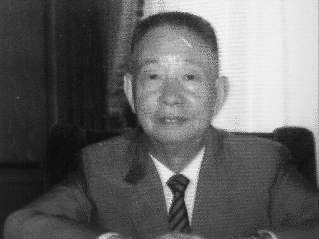
One of the most extraordinary people in the Go world passed away yesterday, August 27, 1997, 1:50 pm local time or 1:50 am US EDT, due to complications that resulted from intestinal cancers. At the age of 84, Mr. Ing Chang-Ki is survived by his wife of more than 60 years, one son, and one daughter.

|
I am sure there are many others who are much more qualified than I am to document Mr. Ing's remarkable career, here I only offer my limited scope and share with the r.g.g. readers glimpses of this career.
I first met Mr. Ing in 1980 and was surprised how he was so accessible and friendly to a young and unknown such as myself. At the time the new Weichi Rules have already been published. Mr. Ing cheerfully explained to me why the new Rules were necessary. He said he had been very much concerned with the complexity of the Japanese Rules that contained so many special rulings. (For the unfamiliar readers, the Japanese Rules contain 15 special case rulings for determining life-and-death alone! -- See Chapter III, Section 7 of the Nihon Ki-in Igo Rules). Mr. Ing believed such questions should be solved by playing out on the board, based on a simple set of rules, without having to resort to case rulings.
The new Rules at the time contained only four items: "Stones are captured when out of liberties", "Capture to prove life and death", "Space and stones are both territories", "Whole-board pattern-repetition is prohibited". A very elegant set of rules that made all of the "case rulings" unnecessary. The last, the "superko rule", is still being used by some Go organizations.
Later, it was pointed out that the "superko rule" had a serious flaw that makes it possible for stone groups that contain a single eye and a "ko eye" to live. This started the spiral of the simple Ing Rules into the great complexity that they present today. It has been pointed out by many people, such as myself and the Chinese rules expert Mr. Wang Ru-Nan (pro 8d), that allowing a single case ruling into the original Ing Rules would solve this problem nicely. But Mr. Ing, with the stubbornness of an axiomatic mathematician, continued to try to resolve this puzzle without having to accept a single case ruling.
How the new Rules will now evolve remains to be seen. But one thing is certain, the new counting method (Rules 2 and 3 above) is clearly considered by most to be superior to the Japanese Igo Rules. Whether the "fill-in" method of counting is used is irrelevant, since the traditional "stone-counting" used in China can easily be used where incomplete sets are used. Another alternative, the AGA Go Rules, is based on the same principles.
A side benefit of this is the removal of the silly "half point" komi, or worse, the "1/4 stone" komi. After all, the board contains 361 points, an odd number, so win or loss should be easily determined without needing to use fractional points (except, of course, the very infrequent sekis that involve odd numbers of shared liberties).
From that first meeting, Mr. Ing always took time to chat with me whenever I visited Taiwan. He shared his vision, his life philosophy, his values, with this audience in awe. His last project, a large-scale self-financed Go school located in Shanghai, has been launched in 1996. During my most recent visit, in January this year, Mr. Ing's eyes still brightened when he mentioned this project, even though at the time he had just recovered from two weeks of unconsciousness following a cancer-related surgery.
Cancer, Mr. Ing's health... another story that is legendary. For over 20 years now Mr. Ing has suffered from diabetes, hypertension, heart problems, then cancer. But you would never know it when you meet him. He is always joyous, energetic; walks fast, talks fast. "Too busy", he always says, "wish I have time to play Go more".
He did not play more, but he made certain the rest of us do. One needs go no further than to look at the recently concluded US Go Congress to appreciate Mr. Ing's impact. The Congress was equipped with nice, uniform Go sets donated and shipped by the Ing Foundation. (Remember the old days when we were asked to bring our own sets and clocks to the Congress?) The Invitational Tournament at the Congress (started in Rochester in 1991) is perhaps the single most important factor that brought out the participation of many of the strongest players. Then there are the youth tournaments that have been so encouraging to the young players that we now see sixty-plus participants in the under-twenty crowd this year. And, of course, the North American Professional Go Association is partly funded by Ing.
The world of Go has lost a great friend. We have all been better off because of his contributions. Let us all take a moment to remember and give thanks to Mr. Ing Chang-Ki.
Thomas Y. Hsiang
- "nomad" on the internet
Here is a link: Another Obituary of Ing Chang-ki.
About the Author: Thomas Hsiang defeated the Chinese representative at the 1998 World Amateur Go Championship. See: America Defeats China in World Amateur Go Championship.
Here are links: